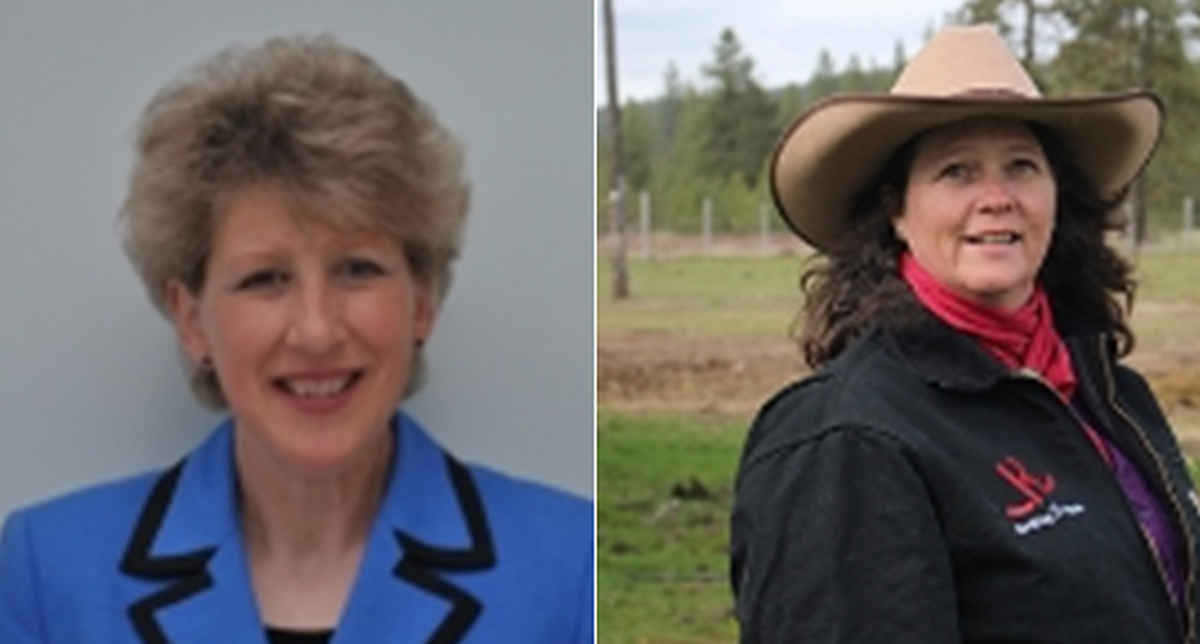Short faces her first Democratic challenger in Hardy in 7th District race

Voters in Northeast Washington may notice something unprecedented on their ballots this fall: A Democrat running for the Legislature against Shelly Short.
No Democrat has run for the Legislature in the 7th District since 2010. Short, who was first elected to the House in 2008, has faced Republicans and even a Libertarian, but never a Democrat.
This year, however, Short is running in a special off-year election to keep her appointment to the Senate seat that opened in January. She’s running against Democrat Karen Hardy, a relative newcomer with something even rarer than a “D” after her name.
She’s a Democrat with enough campaign money to make the race competitive. At $46,500, it’s less than the $110,000 Short had raised a month from the election but significantly more than the $5,346 raised and spent by the last Democrat who ventured into the race in 2010 against longtime Sen. Bob Morton.
State Democratic Chairwoman Tina Podlodowski, elected to that position earlier this year, has made it a goal to “compete in every race in every place,” Ansley Lacitis, party spokeswoman, said. That includes encouraging candidates interested in running and providing them with party backing. In Hardy’s case, that includes some $4,000 in cash plus in-kind donations of staff and other campaign help.
“We’re not conceding any part of the state,” Lacitis said.
Short has party help as well, with $20,500 from the Senate Republican Campaign Committee and another $3,000 from local GOP groups. She said she’s been surprised in previous years when she had no opponent, even with the district’s strong Republican tilt.
“You don’t want to see people not have any competition,” Short said.
Along with being one of the state’s largest geographical districts, the 7th District regularly is at or near the top for the highest unemployment, which offers ammunition for challenger Hardy against veteran lawmaker Short. The district has had Republican legislators for decades, she notes.
“We’re sending Republicans to the West Side to fight with Democrats,” Hardy said. “Why not send a Democrat to work with Democrats?”
Short counters that she has a track record of working across the aisle to boost the district, such as a two-year effort to help land a silicon smelter planned for Usk, Washington. Although Democrats controlled the House for her entire tenure there, she was able to work with their leaders on key issues.
The divide in understanding in the Legislature, she contends, is not so much Republican versus Democrat, but urban versus rural.
Part of that urban-rural divide is the log jam over a state Supreme Court decision on water rights and development, which has put new construction in some rural and suburban areas on hold. When she talks to voters, Short said, their No. 1 concern is finding a solution to what’s known as the Hirst decision. She supports a proposal that would allow cities and counties to rely on the state Ecology Department rules when deciding if there’s enough water for a new development.
The proposal passed the Senate three times but never got a vote in the House.
Solving Hirst would spur development and help employment in the construction trades, she said. Not solving it will have a chilling effect on the district’s economy.
Hardy said having a state agency like the Ecology Department set statewide standards would be preferable to differing local standards. “It needs to be fair across the state,” she said.
When she talks to voters, the issue that comes up most frequently is health care, Hardy said. The state opted to accept extra federal help to expand Medicaid under the Affordable Care Act, providing more people with coverage. The medical expenses it covers have helped keep the district’s hospitals operating, she said, but costs are rising so fast that some people can’t afford to use their coverage, she added.
Although the bulk of the district’s geography contains farms, ranches and small towns, the area that is growing in population is in the suburbs and ex-urbs of north Spokane County, as development marches up the U.S. Highway 395 corridor toward Deer Park. While that might move the political makeup a few degrees toward center, Short said the suburban voters want many of the same things rural voters want: good schools, safe communities and lawmakers who are thoughtful with the budget.
Even if the district may be getting slightly less Republican, Hardy said she has to persuade voters to make their pick on the person, not the party.
“People in this district voted for Trump because they wanted change. I’m hoping they see the same thing in me,” she said.